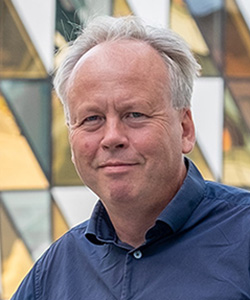Mats Danielsson receives IVA’s Gold Medal for his groundbreaking research

Professor Mats Danielsson has been awarded the Royal Swedish Academy of Engineering Sciences’ (IVA) Gold Medal 2025, for his pioneering work in medical imaging technology.
“I am very proud and see this as a confirmation of many years of work,” Danielsson says.
Danielsson has a long and successful career behind him. He has been at KTH since 1999, and his research has led to both important medical technology innovations and commercial successes with start-up companies. In their motivation, IVA honours Mats Danielsson for his groundbreaking work with sensitive sensors that have enabled early detection of tumours, more accurate diagnoses and more effective treatments.
“Mats Danielsson's commitment, curiosity and determination have resulted in major scientific successes and inspired many young researchers and doctoral students.”
After spending a few years at CERN and Berkeley, Danielsson returned to KTH where he co-founded a prominent research group in sensor technology, focusing on medical applications. He is proud of the way their research has made its way into hospitals and has been used for hundreds of thousands of patients.
“The first photon-counting system for X-ray imaging that was FDA approved was based on our research. We were pioneers in counting individual X-ray photons, which has now become very popular and is being used more and more,” Danielsson says.
Productive professor
He became interested in medical imaging technology early on, as it encompasses several research areas such as physics, mathematics and medicine, as well as various technologies such as semiconductors, electronics, image reconstruction, computer simulations and calculations. Danielsson also enjoys working directly with doctors, who are usually very positive about new technology if it helps them in their daily work.
“You get very direct feedback on how well you're doing when you work with images. Everyone can see when an image is poor, as is often the case when you start using a new technology, but it's all the more rewarding when you can see that it's improving as you work on it,” Danielsson says.
Danielsson has certainly worked hard. He has published over 150 scientific articles and holds 135 patents. He is a co-founder of MedTechLab, where he leads a research programme aiming to develop the next generation of image diagnostics. He has also co-founded several successful technology companies.
“We really wanted our research to benefit patients, and we didn’t see any other options. If an idea comes too early to the big companies, it often gets forgotten.”
“Good ideas always start with bad ideas”
However, the companies’ success is not what Danielsson is not most proud of, but rather the success of his students. Both undergraduate and postgraduate students have taken on prominent positions of responsibility in Swedish industry and academia.
“It’s fun to try to solve important but difficult problems together. Even if it doesn't always go so well and there are detours along the way, it's inspiring to fight together,” Danielsson says.
If he could give one piece of advice to young researchers at the start of their careers, it would be to dare to have visions and stick to them, even if it takes a long time for them to become reality. Another tip is to avoid stress. Instead, he says, do things that make you feel good. It is important not to plan too much and allow yourself to do nothing sensible at all sometimes.
“Don't be sad if an idea you had turned out to be bad; good ideas always start with bad ideas,” he says.
Jon Lindhe ( jlindhe@kth.se )

